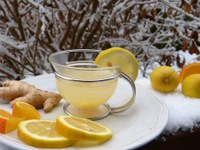Prairie Fare: Try These Tips to Avoid Winter Dehydration
(Click the image below to view a high-resolution image that can be downloaded)
By Julie Garden-Robinson, Food and Nutrition Specialist
NDSU Extension
I was getting a little worried. I could not hear the grumbling sound of the snow blower.
Our driveway and sidewalks were covered with a mountain of snow that drifted in after the latest blizzard.
I poked my head out the front door to check on my husband. He had been outside for more than two hours clearing snow in subzero temperatures.
“Are you OK?” I asked.
“I am almost done out here,” he replied as he leaned on a shovel.
His scarf, stocking hat and hair were frozen, and his clothes were covered in snow. He looked like a snow man, or maybe an ice man.
“The driveway and sidewalk are good enough,” I announced. “Come inside and warm up.”
When I saw my frozen husband, I felt guilty about basking in the warmth of our home. I should have “suited up” in all my winter gear and helped.
I was making soup and bread, so that provided a little comfort, anyway. My husband was thirsty after working outside in the cold so long.
Our North Dakota winter has been more challenging this year than the past few years. We may not realize how cold temperatures and exertion can affect the hydration status of our body. We tend to be more aware of our thirst and need for liquids in the summer when the weather is warm.
Depending on our age and other factors, our bodies are made up of about 60% water regardless of the season.
During the winter, our bodies work to retain the heat in our body’s core, where our vital organs such as heart and lungs are, instead of our feet and hands.
We bundle ourselves in layers of heavier clothes, including sweaters, coats and perhaps, heavy boots. We may not even realize that we are perspiring.
We go from one heated area to another heated area for survival. We travel with our vehicle heaters blowing hot air at us. All that dry air tends to dehydrate our skin.
In the winter, we are losing a lot of water as we breathe in the cold outdoor air and exhale. When you see your breath, that is a signal that water is leaving your body, forming a vapor.
Our level of hydration affects our ability to think and make decisions. We might feel irritable, tired and/or have headaches even with mild dehydration. Our skin may be flaky and itchy.
What’s a person to do?
Let’s start with our skin. Remember to wear a moisturizing broad-spectrum sunscreen on your face, nose and other exposed skin because sun can damage your skin even in the winter.
After coming inside from the cold, you may be tempted to take a long, hot shower, but that may not be particularly helpful. A shorter shower followed by applying lotion to damp skin can help keep your skin healthy.
Next, hydrate your body from the inside. Our body needs an ongoing supply of liquid in order to flush wastes from our body, carry nutrients throughout the body and to regulate our body temperature and many other functions.
Even if you do not feel thirsty, drink more fluids and enjoy water-rich nourishing foods such as fruits and vegetables in the winter. Keep a water bottle with you and sip all day. We need at least two quarts of water a day from beverages and foods.
Remember that you have a “personal hydration meter” available every time you visit the bathroom. Check out the color of your urine. It should be a pale, straw-like color if you are fully hydrated. However, some foods (such as beets and berries) and medications can affect the color of urine.
Warm beverages may be more appealing in the winter than cold beverages, but both will hydrate you.
Caffeinated beverages such as coffee are slightly dehydrating, so you might want to switch to herbal teas or decaffeinated coffee in the afternoon if you need a caffeinated pick-me-up in the morning.
Alcohol-containing beverages are not hydrating and can have a “diuretic” (or water-losing) effect. Be sure to counterbalance caffeinated and alcohol-containing beverages, if you consume them, with extra glasses of water.
Here’s a simple recipe that you can modify to suit your taste for sweetness. The basic ingredients may have some health benefits in addition to hydrating your body.
Honey is rich in natural disease-fighting antioxidants, and darker honey provides more antioxidants than light. Honey has been used as a cough suppressant, and it may have some immune-boosting effects.
Lemon juice is rich in the antioxidant vitamin C, which may help fight colds through its effect on boosting the immune system.
Ginger root adds flavor to your beverage and is rich in antioxidants with potential disease-fighting benefits.
Honey, Lemon and Ginger Tea
1 cup hot water
1 tablespoon fresh lemon juice
1 tablespoon honey
1 small slice peeled ginger root (about 1 teaspoon)
Heat water. Add lemon juice, honey and ginger root, if desired. Stir well to dissolve the honey. Allow to stand a couple minutes to blend flavors. Remove ginger and savor the warming effect.
Makes one serving with 70 calories, 0 grams (g) fat, 0 g protein, 19 g carbohydrate, 0 g fiber and 10 milligrams sodium.
(Julie Garden-Robinson, Ph.D., R.D., L.R.D., is a North Dakota State University Extension food and nutrition specialist and professor in the Department of Health, Nutrition and Exercise Sciences. Follow her on Twitter @jgardenrobinson)
NDSU Agriculture Communication – Jan. 27, 2022
Source: Julie Garden-Robinson, 701-231-7187, julie.garden-robinson@ndsu.edu
Editor: Elizabeth Cronin, 701-231-5391, elizabeth.cronin@ndsu.edu


